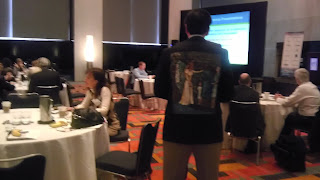I was invited by Jill Ozoveck of ExlPharma and want to give a shout out to her for organizing a great conference.
The moderator was Linda Strause of Vical Incorporated where she is Executive Director and Head of Clinical Research. She also has the unique perspective of having been a caregiver to her late husband who suffered terminal brain cancer. She understands both the research and patient sides of this conversation.
The panel was comprised of myself, Kerri Sparling of Six Until Me, (addressing diabetes), and Sean Ahrens of Crohnology.com (for Crohn's Disease). My two fellow panelists were young enough to be my kids, but smart enough to teach me a thing or two about not only social media but public speaking.
We gathered in the conference room at 7:45 a.m. to have a pre-conference discussion and strategize about the direction we wanted the presentation to take. It was going to be one with audience participation as we wanted to start a dialog with researchers and engage them in how to best utilize social media for recruitment and retention in clinical trials.
We had five minutes to introduce ourselves as the panel kicked off. In sticking to my tried and true patented method of When in a Panic, Get It Over With Quick, I volunteered to go first.
Let me preface what happened next with a little back story. I have been speaking as a patient on behalf of Novartis, sharing my experience with MS and Gilenya for over a year now. I have become comfortable with speaking and no longer practice all night the night before in front of a mirror, stressing out about the weird tics, funny southern twang, or letting a "ya'll" inadvertently escape my lips.
So, the night before this panel I was sleeping like a baby after glancing over the notes from our conference call a few weeks earlier, telling myself "you got this!". Instead of sweating it, I went to sleep. So there was no organization to my thoughts whatsoever. As they mic'd me up with the lavalier microphone and Sean was busy working with the sound guy to figure out how to get his Power Point and video set up, I told them I wanted to go first because "no way am I following a slideshow intro."
But what came out of my mouth was just as much a surprise to me as it was to my audience. Totally random and from my heart. I figured I reach people better when I talk to them as if it's a conversation anyhow. It is more genuine and even though I'd like to be more sophisticated/organized and have my own video or slideshow, speaking as if we are all hanging out at the kitchen table is apparently preordained to be my style.
I opened with how happy I was to be there as part of the panel in Philly that day because I am from Florida and hadn't seen snow in thirty years. I got some laughter, but Kerri got more when she started her intro and said she didn't share my sentiments about the snow because she's from RI and she's "over it."
All joking aside, we had a great discussion and I think it was more than that. It was also almost a brainstorming session about how to connect with patients in order to recruit them using today's technology. My suggestion was to "go viral". If Grumpy Cat can do it and we have all seen Pepsi's test drive with Jeff Gordon then why can't Big Pharma reach out to the American public just to say "hey, we're here if you want a viable alternative to those treatments that aren't working any more." They wouldn't have to directly try to "coerce" people to join a specific trial, but let's face it, Big Pharma's research department needs a PR team.
Do what marketing does for your drugs after it gets approved. We know your hands are tied by the FDA when it comes to what you can and can't do, but like Kerri said (an analogy I will never forget) "There's still a lot you can do with handcuffs on!"
Let me illustrate what I think the problem is here...
Things have always been done a certain way in regard to how researchers view the patients, or "subjects" (a word that insinuates researchers are masters of their "kingdom" as Kerri pointed out, and we are the subjects.). This tunnel vision that has developed from countless years of focusing only on the data-gathering side and less on the human factor needs to be addressed.
Example:
When the conference broke for lunch, the attendees started pouring in. I was hovering near the buffet and jumped in front of the pack. There were huge dinner plates near the entrees and hot sides, but then over by the salads they had another stack of huge dinner-sized plates.
Problem:
I heard someone say they had to go put their dinner plate down and come back for the salad because the plates were so huge.
My solution:
This was when I look around the room and saw the dessert bar. Small salad plates stacked up for you to carry your selections on. I grabbed one of those and put my salad on it. Problem solved, table less cluttered with huge Frisbee sized china.
Result:
The gentleman who had commented about the size of the salad plates, yet complied and took one because it was the "designated plate" commented on how smart I had been to use the dessert plate instead.
Conclusion:
I see this as a clear demonstration of our two ways of thinking. He was an attendee from the research side of things, and I was a patient speaker there to hopefully give a panoramic view of the World According to Social Media to those researchers who can only see the sky from their vantage point of looking up from the box to which they have confined their methods.
Maybe it's because I'm uncouth and lack etiquette that I DARED grab a dessert plate and unceremoniously plop my mixed greens atop it and splatter it with vinaigrette while others watched in complete and utter disbelief (with possibly a little horror thrown in). But I just saw it as the sensible, logical thing to do. Why should my dining experience be defined by someone else's idea of what size plate I should use to transport my nutrition? The plate is but a soulless vessel that cares not what it carries. I should mindlessly believe that the person given the task of setting up the buffet did the right thing in grabbing the dinner plates to position next to the salad? What if later we all found out he was reprimanded sternly? "You fool! You put the dinner plates by the salad instead of the bowls you were told to use! You're fired!"
We as diners let the Pied Piper/Plate Provider lead us over the cliff of Unnecessary Table Clutter, mindlessly doing as we were instructed.
But I'm the type of person who hates to be told what to do. Ask my mother. I do what seems right and what makes sense. And the more empowered and confident I become, the less likely I am to care about what others around me might make of my odd behavior. My youngest son, who is a freshman in high school and learning how to fit in (grossly overrated in my opinion), is always on guard for me to say or do something unexpected and thoroughly embarrass him with my bold and blatant lack of concern for conformity.
Hence the dessert plate holding my salad.
What does this have to do with social media you ask?
Good question. The answer is nothing. And everything.
If we want to drag Clinical Trials into the 21st century kicking and screaming, and clinging to outdated methods, we need to only look as far as the dessert plate holding the salad.
Face it, your big dinner plates are crowding the table with your smidgen of salad.
Look for fresh ideas in places you haven't yet. Social media doesn't have to be the unknown, intimidating medium. Use it to your advantage. Knowing you are cuffed by the FDA in that you can't do all you want in terms of reaching your patient audience, you can still kick your feet and make some waves.
I want to say to patients about the idea of considering a clinical trial: "You can do this! It's not so scary and it opens up more options available to consider."
On the other hand, I want to say to researchers: "You can do this! Embrace social media and leverage it to educate people on what you're all about. Take away the bad rap that plagues Big Pharma. Where is your PR firm letting us know that each and every one of you got into this line of work because you are driven to make people's lives better?"
Connect. Educate. Recruit. Retain.
Expedite Quality of Life for everyone.
Use Twitter, Facebook, YouTube, Pinterest and any other conduit for connecting.
Help me get a panel of patients before the FDA so we can start a conversation about where social media fits into all of this. I'm here and willing to keep the conversation going. Let's do this!
The panel discussion ended all too soon and I had to depart after lunch to have a mini family reunion with my brother and his wife. They drove from Annapolis over to Philadelphia to spend the day with me.
We walked around Reading Terminal Market and had a great time. Sat down at a lunch counter to get a cheese steak and ended up having a pork sandwich instead because DiNic's doesn't do Philly Cheese Steaks. But the pork was fabulous.
My view from my room was something ingrained in my brain forever. Philly is a gorgeous town. Highly underrated.
For your viewing pleasure, I had grouped these photos at the bottom of my blog post. Actually, that's where blogger added them and I'm too lazy to rearrange everything. Enjoy!
 |
| I felt so small! High ceilings, huge mirrors, gorgeous accommodations. |
 |
| I thought I'd check out what was on TV... until I glanced out the window. I was mesmerized just watching the city for a while. |
 |
| The view went on seemingly forever. |
 |
| So THAT'S why the room was so expensive. The 50lb terrycloth too big robes. |
 |
| Almost late for the pre-conference meeting when I looked out and saw SNOW!!! |
 |
| and another shot of the snow because you can't have too many pics of the snow when you're a Floridian. That's Reading Terminal Market under the big roof on the right. |





